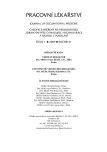Smoking increases the impact of occupational risks on health of workers
Authors:
D. Hrubá
Authors‘ workplace:
Ústav preventivního lékařství, Lékařská fakulta Masarykovy univerzity
přednosta prof. MUDr. Zuzana Brázdová, DrSc.
Published in:
Pracov. Lék., 61, 2009, No. 1, s. 27-31.
Category:
Review article
Overview
Chemical compounds in cigarette smoke potentiate directly or indirectly effects of risk factors in working environment. There is a relative contraindication of work of smokers especially in dusty, hot and chemical workplaces, during the work exposed to cold, noise and vibrations. It would be suitable to rank restaurants where smoking is allowed among risk workplaces with the occurrence of chemical carcinogens. Occupational physicians should initiate establishing of „nonsmoking entreprises“ and motivate actively smoking workers towards quitting smoking.
Key words:
smoking, work risks, potential of effects, prevention
Sources
1. International Agency for Research on Cancer (IARC). IARC Monographs on the Evaluation of the Carcinogenic Risk of Chemicals to Humans: Tobacco Smoking. Monograph 38, Lyon, France, 1986.
2. US Department of Health and Human Services (US DHHS): The health consequences of involuntary smoking. A report of the Surgeon General. DHHS Publica-tion No.(CDC) 87-8398. Washington, DC: US Government Printing Office, 1986.
3. US Department of health and human services (US DHHS) The health consequences of involuntary smoking. Rockville, MD; US Department of Health and Human Services, Centers for Disease Control and Prevention (CDC), 2006
4. World Health Organization Update status of the WHO Framework Convention on Tobacco Control. Geneva: WHO, 2006.
5. BARNES, R. I., GLANTZ, S. A. Endotoxins in tobacco smoke: Shifting tobacco industry position. Nicotine and Tobacco Res., 2007, First Article, s. 1–10, doi 10.1080/1488392.
6. BENOWITZ N. L. Pharmacology of nicotine: addiction, smoking-induced disease, and therapeuties. Ann. Res. Pharmacol. Toxicol., 2009, 49 s. 57–71, doi:10.1146/annurev.pharmtox.48.113006.094742.
7. BLOOMER, R. J., SOLIS, A. D., FISHER-WELLMAN, K. H., SMITH, W. A. Postprandial oxidative stress is exacerbated in cigarette smokers. Br. J. Nutrition, 2007, doi:10.1017/S0007114507844370.
8. EZZATI, M., LOPEZ, A. D. Estimates of global mortality attributable to smoking in 2000. Lancet, 2003, 362, s. 847–852.
9. HABROVÁ, D., HRUBÁ, D. Ekonomika kuřáctví v České republice. Hygiena, 2007, 52, 4, s. 110–114.
10. HECHT, S. S. Cigarette smoking and lung cancer: chemical mechanisms and approaches to prevention. The Lancet Oncology, 2002, 3, s. 461–469.
11. HRUBÁ, D. Kouření a jeho vztah k metabolickému syndromu a „civilizačním“ chorobám. Hygiena, 2003, 48, 4, s. 217–221.
12. KHATER, A. E. M., EL-AZIZ, N. S. A., AL-SEWAIDAN, H. A., CHAOUACHI, K. Radiological hazards of Narghile (hhokah, shisha, goza) smoking: activity concentrations and dose assessment. J. Environ. Radioact., 2008, doi:10.1016/j.jenvrad.2008.07.005.
13. LOH, M. M., HOUSEMAN, A. E., LEVY, J. I. et al. Contribution to volatile organic compound exposures from time spent in stores and restaurants and bars. J. Exposure Sci. Environ. Epidemiol., 2008, Nov. 12, doi: 10-1038/jes.2008.62.
14. MACKAY, J., JEMAL, A., LEE, N. C., PARKIN, D. M. The Cancer Atlas. Atlanta, USA: American Cancer Society, 2006, 128 s.
15. PETO, R., LOPEZ, A., BOREHAM, J. et al. Mortality from smoking in developed countries 1950-2000. Indirect estimates from National Vital Statistics. Oxford: Oxford University Press, 1994, 553 s.
16. POURYAGHOUB, G., MEHRDAD, R., MOHAMMADI, S. Interaction of smoking and occupational noise exposure on hearing loss: a cros-sectioal study. BMC Public Health, 2007, 7, s. 137, doi:10.1186/1471-2458-7-137.
17. RABINOFF, M. Pharmacological and chemical effects of cigarette additives. Am. J. Publ. Health, 2007, 97, 11, doi:10.2105/AJPH.2005.078014.
18. SCHICK, S. F., GLANTZ, S. Sidestream cigarette smoke toxicity increases with aging and exposure duration. Tob. Control., 2006, 15, s. 425–429.
19. SCHICK, S. F., GLANTZ, S. Concentrations of the carcinogen NNK in sidestream cigarette smoke increase after release into indoor air: Results from unpublished Tobacco Industry Research. Cancer Epidemiol. Biomarkers Prev., 2007, 16, 8, s. 1547–1553.
20. ZIMMERMANN-STENZEL, M., MANNUS, J., SCHNEI-DER, S., SCHILTENWOLF, M. Smoking and chronic back pain. Dtsch. Arztebl. Int., 2008, 105, 24, s. 441–448.
Labels
Hygiene and epidemiology Hyperbaric medicine Occupational medicineArticle was published in
Occupational Medicine

2009 Issue 1
-
All articles in this issue
- Organization, reorganization and activities of the medical assessment service
- Analysis of the occurrence of occupational disease risk in the Czech Republic in 2001–2007
- Occupational medical care in a small lead foundry
- Position of nasal exposure tests in diagnostics of occupational rhinitis
- Smoking increases the impact of occupational risks on health of workers
- Occupational allergic skin diseases
- Occupational Medicine
- Journal archive
- Current issue
- About the journal
Most read in this issue
- Occupational allergic skin diseases
- Position of nasal exposure tests in diagnostics of occupational rhinitis
- Organization, reorganization and activities of the medical assessment service
- Smoking increases the impact of occupational risks on health of workers
